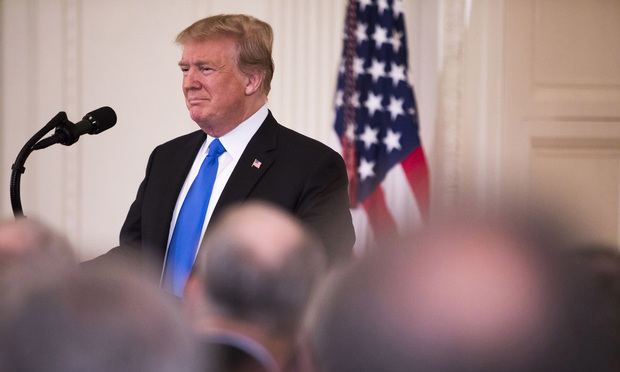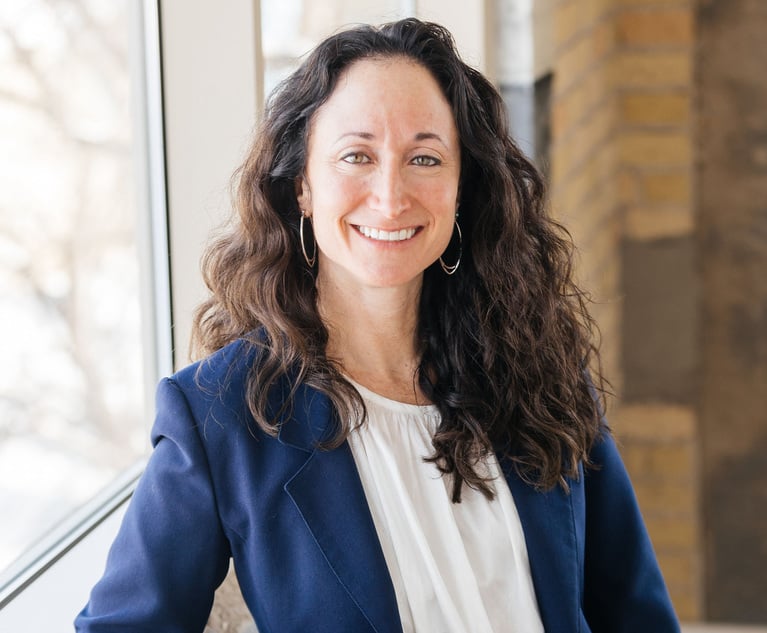No Court Has Ever Ruled That a President May Claim Immunity From Investigation
Without getting into arcane discussions of federalism, the larger point is that the substance of Mr. Trump's argument is awe-inspiring in its threat to our institutions. This issue is not about this particular president; rather it is about the rule of law.
September 24, 2019 at 09:31 PM
6 minute read

Donald Trump has filed suit asking a federal judge to issue an injunction barring the New York County grand jury from gathering evidence as to whether he—and his accomplices—committed crimes in Manhattan. Although the United States Supreme Court has previously ruled that federal courts should not intervene in state criminal proceedings, Mr. Trump ignores clear law that goes to the essence of our federal structure under the Constitution.
Without getting into arcane discussions of federalism, the larger point is that the substance of Mr. Trump's argument is awe-inspiring in its threat to our institutions. This issue is not about this particular president; rather it is about the rule of law.
Mr. Trump's argument is that he may not be prosecuted–or even investigated–while he is president, for any crime whatever. In late January 2016, then-candidate Mr. Trump famously bragged that he could shoot someone on Fifth Avenue and not lose any support. Applying Mr. Trump's current legal argument to his prior braggadocio, he would make it unlawful for New York not just to prosecute him but even to gather evidence relating to his supposed Fifth Avenue shooting.
First, it should be noted that the Constitution says nothing about presidential immunities under the law, state or federal. No court has ever ruled that a president may claim immunity from investigation and there are strong legal arguments against this view. For example, the Constitution gives certain limited immunity to members of Congress, but not to the president.
As the late Justice Antonin Scalia has urged, "The text is the law, and it is the text that must be observed." The text–the Constitution–provides no immunity to the president. Had the framers wanted to extend immunity to the president, they could have. But they did not.
Moreover, the lawsuit by Mr. Trump in federal court challenging a state grand jury investigation flies in the face of our federal system of governance, which reserves the state police power to the states themselves, free of interference by the federal judiciary.
The Supreme Court addressed this issue in 1971 in Younger v. Harris where, in a different context, the court held that federal courts may not intervene in state court criminal proceedings absent extraordinary circumstances, such as bad faith by the prosecutor, harassment or similar circumstances. As the court noted in Younger, the policy of permitting state courts to prosecute state cases free from interference by the federal courts is embedded in our policies "[s]ince the beginning of this country's history."
In addition, whatever the merits of the contention that a sitting president should not have to face criminal trials during his or her term of office, that has nothing to do with whether a grand jury may collect evidence as to whether crimes were committed, and if so, by whom. Mr. Trump's application to the federal court is to bar entirely the collection of evidence by a separate state sovereign–including against any possible accomplices and co-conspirators and the business entities with which and through such crimes may have been committed. A fair reading of Mr. Trump's court papers suggests that the people he seeks to protect are his long-time business associates and children and that the businesses are companies he owns.
Thus, not only does Trump claim immunity for himself, he seeks to extend that cone of immunity to his accomplices (including family members) by asserting that his own immunity from prosecution means that evidence cannot be gathered against him or potential co-conspirators while he is president. He claims that "the subpoena targets the president's businesses," and thus "violates the Constitution," and that the subpoena cannot be enforced until after he leaves office.
Of course, at that time he would be protected by statutes of limitation, which would bar prosecution of anyone for most crimes more than five years old. In this fashion, Mr. Trump attempts to put his affairs above the law and beyond its reach.
The claim that a subpoena seeking evidence is invalid because it seeks evidence against a corporation in which the president has an economic interest is unprecedented and without support in the law. Corporations, which are separate legal entities, cannot be immune from prosecution merely because they are owned by a sitting president. Individuals cannot be immune from prosecution merely because they engaged in business with or are related to a sitting president.
It is clear that Mr. Trump can expect a fair and decent evaluation of the evidence by the current district attorney; that may be what he fears. It has been widely reported that when the district attorney's office previously investigated Mr. Trump, his family and associates, District Attorney Vance decided that the case did not warrant prosecution, and no one was prosecuted.
Thus, Mr. Trump cannot reasonably claim that he is being subject to "harassment" or "bad faith," as required by the Supreme Court's clear precedent. Mr. Trump knows the facts here very well, so his continuous efforts to keep evidence from the jury must reflect a well-grounded fear based on his own knowledge that the evidence, this time, would inevitably lead to criminal charges.
His efforts to stymie the investigation are based on no law whatever, merely his will that he, his accomplices, family and businesses are not bound by the laws governing the behavior of others. That is how a despot thinks. Mr. Trump should not be allowed to run out the clock with arguments that should be laughed out of court—and quickly.
Nor should he be allowed to bypass New York State Court, which has jurisdiction, with an illegal end-run to federal court in the illusory hope that a politically appointed judge will disregard the law in favor of political loyalty. For the sake of the Constitution and our system of governance, Mr. Trump's lawsuit should be summarily dismissed.
John Moscow is senior counsel at Lewis Baach Kaufmann Middlemiss and Adam Kaufmann is a partner. Both were formerly with the New York City District Attorney's Office.
This content has been archived. It is available through our partners, LexisNexis® and Bloomberg Law.
To view this content, please continue to their sites.
Not a Lexis Subscriber?
Subscribe Now
Not a Bloomberg Law Subscriber?
Subscribe Now
NOT FOR REPRINT
© 2025 ALM Global, LLC, All Rights Reserved. Request academic re-use from www.copyright.com. All other uses, submit a request to [email protected]. For more information visit Asset & Logo Licensing.
You Might Like
View All
‘Catholic Charities v. Wisconsin Labor and Industry Review Commission’: Another Consequence of 'Hobby Lobby'?
8 minute read
AI and Social Media Fakes: Are You Protecting Your Brand?

Neighboring States Have Either Passed or Proposed Climate Superfund Laws—Is Pennsylvania Next?
7 minute read
Trending Stories
- 1New York-Based Skadden Team Joins White & Case Group in Mexico City for Citigroup Demerger
- 2No Two Wildfires Alike: Lawyers Take Different Legal Strategies in California
- 3Poop-Themed Dog Toy OK as Parody, but Still Tarnished Jack Daniel’s Brand, Court Says
- 4Meet the New President of NY's Association of Trial Court Jurists
- 5Lawyers' Phones Are Ringing: What Should Employers Do If ICE Raids Their Business?
Who Got The Work
J. Brugh Lower of Gibbons has entered an appearance for industrial equipment supplier Devco Corporation in a pending trademark infringement lawsuit. The suit, accusing the defendant of selling knock-off Graco products, was filed Dec. 18 in New Jersey District Court by Rivkin Radler on behalf of Graco Inc. and Graco Minnesota. The case, assigned to U.S. District Judge Zahid N. Quraishi, is 3:24-cv-11294, Graco Inc. et al v. Devco Corporation.
Who Got The Work
Rebecca Maller-Stein and Kent A. Yalowitz of Arnold & Porter Kaye Scholer have entered their appearances for Hanaco Venture Capital and its executives, Lior Prosor and David Frankel, in a pending securities lawsuit. The action, filed on Dec. 24 in New York Southern District Court by Zell, Aron & Co. on behalf of Goldeneye Advisors, accuses the defendants of negligently and fraudulently managing the plaintiff's $1 million investment. The case, assigned to U.S. District Judge Vernon S. Broderick, is 1:24-cv-09918, Goldeneye Advisors, LLC v. Hanaco Venture Capital, Ltd. et al.
Who Got The Work
Attorneys from A&O Shearman has stepped in as defense counsel for Toronto-Dominion Bank and other defendants in a pending securities class action. The suit, filed Dec. 11 in New York Southern District Court by Bleichmar Fonti & Auld, accuses the defendants of concealing the bank's 'pervasive' deficiencies in regards to its compliance with the Bank Secrecy Act and the quality of its anti-money laundering controls. The case, assigned to U.S. District Judge Arun Subramanian, is 1:24-cv-09445, Gonzalez v. The Toronto-Dominion Bank et al.
Who Got The Work
Crown Castle International, a Pennsylvania company providing shared communications infrastructure, has turned to Luke D. Wolf of Gordon Rees Scully Mansukhani to fend off a pending breach-of-contract lawsuit. The court action, filed Nov. 25 in Michigan Eastern District Court by Hooper Hathaway PC on behalf of The Town Residences LLC, accuses Crown Castle of failing to transfer approximately $30,000 in utility payments from T-Mobile in breach of a roof-top lease and assignment agreement. The case, assigned to U.S. District Judge Susan K. Declercq, is 2:24-cv-13131, The Town Residences LLC v. T-Mobile US, Inc. et al.
Who Got The Work
Wilfred P. Coronato and Daniel M. Schwartz of McCarter & English have stepped in as defense counsel to Electrolux Home Products Inc. in a pending product liability lawsuit. The court action, filed Nov. 26 in New York Eastern District Court by Poulos Lopiccolo PC and Nagel Rice LLP on behalf of David Stern, alleges that the defendant's refrigerators’ drawers and shelving repeatedly break and fall apart within months after purchase. The case, assigned to U.S. District Judge Joan M. Azrack, is 2:24-cv-08204, Stern v. Electrolux Home Products, Inc.
Featured Firms
Law Offices of Gary Martin Hays & Associates, P.C.
(470) 294-1674
Law Offices of Mark E. Salomone
(857) 444-6468
Smith & Hassler
(713) 739-1250






